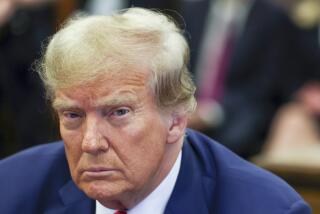U.S. Trust Will Pay $10-Million Penalty
- Share via
U.S. Trust Corp., the blue-blood investment firm owned by Charles Schwab Corp., agreed to pay a $10-million penalty to regulators for allegedly violating rules designed to prevent money laundering and other fraud.
U.S. Trust did not admit to any wrongdoing in its settlement with the Federal Reserve Board and the New York State Banking Department over allegations that its bookkeeping procedures and internal controls were inadequate, regulators and the company said Friday.
The civil penalty is one of the largest assessed by banking regulators in connection with the Bank Secrecy Act, which regulates currency transactions.
“It’s a dramatic penalty,” said John Byrne, senior counsel for the American Bankers Assn., a trade group. “It says the Federal Reserve is still very much interested in enforcing the Bank Secrecy Act and money-laundering regulations.”
Regulators in a cease-and-desist order alleged that U.S. Trust failed to comply with laws and regulations governing currency transactions and the reporting of suspicious activity in customer accounts.
The order also alleged that the company kept inadequate records in its Strategic Trading Group, a division that processes trades in restricted securities for its clients. Restricted securities are stocks typically issued in private deals to company insiders and wealthy investors.
“U.S. Trust has acknowledged deficiencies and the need for immediate corrective action,” the order said.
Regulators declined further comment and would not say what prompted their investigation or whether money laundering had been detected at the company. Money laundering occurs when large sums from illegal activities such as drug trafficking are given the appearance through banking or securities transactions of originating from a legitimate source.
U.S. Trust, which manages $91 billion, said that none of its customers’ money was at risk and that no money laundering had been discovered.
Company officials said they already had taken steps to improve the 148-year-old firm’s adherence to banking regulations, including investing $20 million in technology to monitor currency transactions and adding 10 people to its compliance department.
The company also was making plans to transfer supervision of the Strategic Trading Group to its parent, Schwab, which as a broker-dealer would be better able to monitor the unit’s trading activities, said U.S. Trust spokeswoman Allison Kellogg.
The fine, to be split evenly between federal and state regulators, was the largest assessed by the New York State Banking Department, regulators said.
New York in recent years has increased its scrutiny of banks and other financial institutions in the wake of federal regulators’ allegations that Bank of New York and other institutions laundered money for criminals.
Bank of New York last year settled allegations it laundered $7 billion, which was allegedly moved illegally out of Russia, by agreeing to better monitor its money-transfer activities. The bank was not fined.
The penalty against U.S. Trust also was one of the largest assessed by the Fed for violations of money-laundering rules, although the central banking regulator has assessed much larger fines against banks for other violations. In 1992, the Fed levied a $200-million penalty against the now-defunct Bank of Credit and Commerce International, or BCCI, for failing to disclose its ownership interest in U.S. banks, a Fed spokesman said.
San Francisco-based Schwab, the nation’s largest discount and online brokerage, purchased U.S. Trust last year for nearly $3 billion in stock. The transaction widened Schwab’s access to some of the nation’s wealthiest investors and families, including some that have been U.S. Trust clients for several generations.
New York-based U.S. Trust has offices in Beverly Hills, Los Angeles, Costa Mesa and Palo Alto.
Banks and other financial institutions that cater to the wealthy face a difficult balance between trying to comply with money-laundering regulations and serving legitimate customers who don’t want transactions delayed by bank compliance procedures, said Bruce Zagaris, a New York attorney who specializes in international law and banking regulation.
“You don’t want to be so vigilant that you lose clients, but vigilant enough so that you don’t have law enforcement and regulators investigating you, especially if you’re going to get fined $10 million and have [reporters] writing stories about you,” Zagaris said.
Schwab’s stock rose 21 cents to $15.23 in New York Stock Exchange trading Friday.
More to Read
Inside the business of entertainment
The Wide Shot brings you news, analysis and insights on everything from streaming wars to production — and what it all means for the future.
You may occasionally receive promotional content from the Los Angeles Times.








